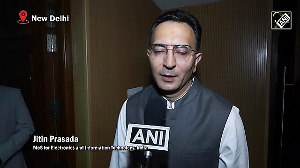Rating of fund managers is not very prevalent in the Indian mutual fund sector.
One of the reasons for this is that fund managers are a faceless entity and investors usually look at the fund house rather than who is managing it.
For instance, when an investor puts his money into the Unit Trust of India, it is the brand equity of the fund he is entrusting his money with. He is not bothered about the actual person who might be managing his money.
However, the rise and fall of Samir Arora, the former fund manager with Alliance Capital Mutual Fund, who gained more fame than his fund house, should set investors thinking about how their fund managers are performing.
The most basic formula for identifying a good fund manager would be to opt for one who gives the maximum returns with minimum risk.
This may sound like a very idealised situation but it is the most common-sense approach to investing.
Investors mostly think only of returns and in the process forget about the risk associated. So, what an investor should aim for is consistent, reasonable returns over a long period of time with minimum of downsides.
With this fundamental truth fixed in our minds, we can now proceed to the next step of rating fund managers.
Track record is, of course, a simple way of rating a fund manager - if a fund manager has given consistent good returns, you can be sure that he will deliver the goods and you can rate him highly.
However it is always safer to look at absolute returns - that is, how much money you
have actually got instead of average annual returns.
The key is consistency: A fund manager who gives 20 per cent returns one month and immediately follows it with negative returns the next month is not a good proposition. In fact, according to industry watchers, compounded annual returns would be a better indicator of performance.
Next, look at the portfolio: Mutual funds give monthly portfolio disclosures - a few of them offer weekly disclosures.
Go through the portfolio holdings carefully - if scrips, which are not doing well, still find their place in the list over a long period of time then the fund manager is not doing justice to his mandate.
A good fund manager would know when to cut his losses and invest in scrips which have better chances of upsides.
Churning of portfolio: Whether it is within the same class of securities or between different classes, it is imperative to the success of a fund.
Lazy fund managers should be dumped: Trading strategies of a fund manager are very important. For instance, never bet on a fund manager who gets drawn into the momentum game in the market. These are the kind of fund managers who have no trading strategies of their own or have very poor market intelligence and depend upon the market gossip to trade.
They might give good returns, not due their skills, but due to the general bullishness in the market or the sector in which they are investing.
Talk to the fund manager: You are entrusting your money to and find out how much he or she knows about the company and sector he or she is investing in. Domain knowledge is an important criteria for rating a fund manager.
The clincher is consistent returns: This is one point which cannot be stressed upon too much. In order to rate a fund manager it is necessary to track his performance over a period of time.




